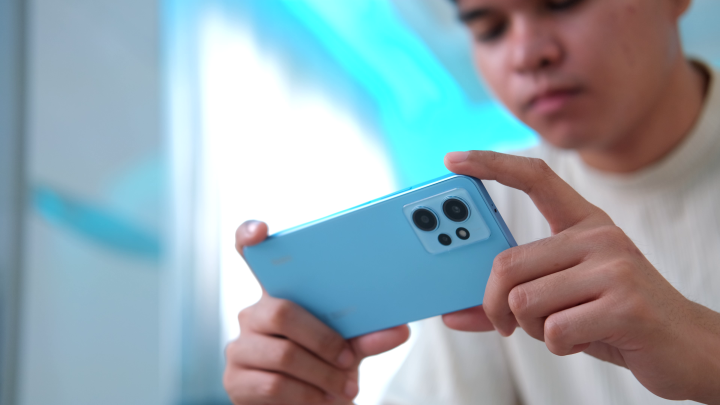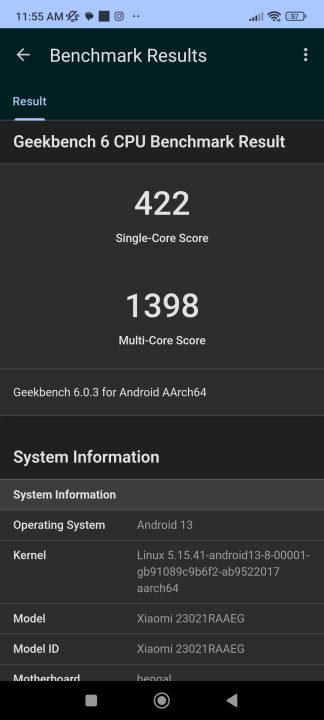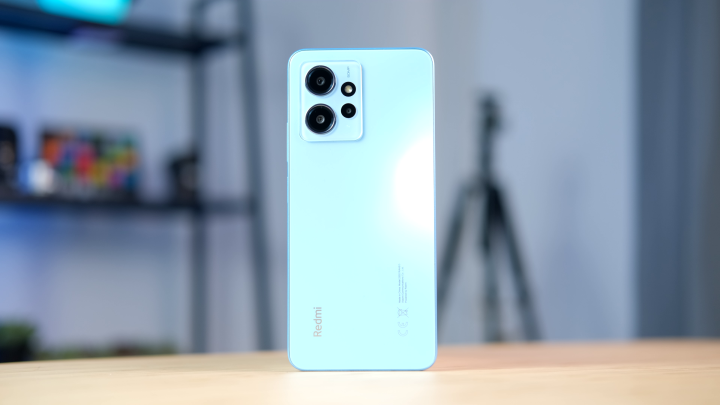Xiaomi’s Redmi Note line has become a popular budget-to-mid-range choice for years, and it’s easy to see why. The Note series has continually offered really good devices at even better prices — making them good options for those looking for a new phone under Php 12,000.
Also, check out our Redmi Note 12 Pro+ Review 105.
But with the mid-range segment being more competitive than ever, does the all-new Redmi Note 12 20 phone bring enough features to carry on the Note line’s mid-range legacy?

Let’s find out in our full review of the Redmi Note 12.
Table of Contents
The Redmi Note 12 features Corning Gorilla Glass 3 on the front and a polycarbonate (plastic) panel on the back. It has a chamfered plastic frame and rounded corners.

On the hand, the Note 12 feels comfortable to hold. The 183.5-gram weight makes the phone feel light and easy to carry despite the large screen size.
On the back, we find a matte-metallic finish that looks good in different lighting scenarios but does pick up fingerprints and oils after use. The Note 12 variant we had for testing was the Ice Blue variant, which is a fun color choice for sure. You can also get the Note 12 in either Onyx Gray or Mint Green.

The cameras on the Note 12 sit on a transparent camera module that looks minimal and, from our experience, helps with preventing dust from getting in between the lenses.
Lastly, the Redmi Note 12 is rated with IP53 water resistance. It may not be the highest water and dust resistance but we’re glad Redmi included some protection from nature for the Note 12.
For the display, the Note 12 has a 6.67-inch FHD+ AMOLED DotDisplay with a 120 Hz refresh rate. It has a punch-hole notch on top and reasonably sized bezels (with the bottom being the thickest part).

For my money, the Note 12’s display is easily its best feature. With its 1200 nits of peak brightness, it gets plenty bright both indoors and outdoors.
Colors are poppy but aren’t overly saturated and viewing angles are really good too, with no loss in screen quality when the phone is tilted.

Viewing any type of content on the screen was a pleasurable experience and the fast refresh rate also helps in making everything feel smooth as well.
In terms of speakers, the Note 12 only has one single, downward-firing speaker at the bottom. This is unfortunate since the single downward-firing speaker at the bottom is really good. It can get loud without distortion and can serve you in a pinch if you want to play a quick song in your room. The lack of an earpiece speaker is a miss in our book.

Aside from the great display, the Note 12 also has two features long lost on modern smartphones — a 3.5mm headphone jack and an IR blaster. Plus points from us.
It also has a side-mounted fingerprint sensor on top of the power button that’s fast and reliable. We wished more phones used this fingerprint sensor placement as it’s really convenient and is still more reliable than any under-screen sensor we’ve tested so far.

Lastly, the Note 12’s haptics are sadly lackluster. They’re average at best but the vibration motor seems to be turned up to 11 which makes the phone feel cheap and less refined.
Otherwise, the Redmi Note 12’s great display, fast fingerprint sensor, and decent speakers make it a pretty good device for multimedia and content consumption.
For cameras, the Redmi Note 12 has a triple camera setup led by a 50MP wide sensor, an 8MP ultrawide, and a 2MP macro camera.

Like most Android mid-rangers these days, the Note 12 can produce good photos under well-lit conditions. These outdoor shots we got had good detail and accurate colors.

I personally appreciated how the Note 12 didn’t try to overexaggerate or oversaturate colors to make them more “punchy,” given that some phones do this to appear more vibrant for social media apps. As seen here, the Note 12 was able to capture the gloomy sunset around this neighborhood.

Indoor photos are the same as well, with the Note 12 being able to properly adjust brightness and exposure to compensate for the lack of light.


While the Note 12 performs well outdoors and indoors, it struggles with night photography. Although the colors are properly captured, the Note 12 had a hard time maintaining detail and most night shots came out grainy and blurry.

In other words, people who like to take photos at night ought to look elsewhere as the Note 12 probably won’t be enough for them.

For selfies, the Note 12 has a 13MP front-facing shooter that pleasantly surprised us. Selfies from the Note 12 were balanced and skin tones were, for the most part, accurately depicted.


We also appreciate that the Note 12 doesn’t overdo it in terms of beauty effects or over-brightening faces, which is a trend in smartphones at this price.
For video, the Note 12’s camera was average. It isn’t the sharpest video on any smartphone but there weren’t any glaring issues aside from detail. Video from the Note 12 wasn’t choppy and the stabilization was surprisingly good too (as seen below).
Overall, the Redmi Note 12 brings an above-average camera package that I would not have any issue at all bringing as my own personal photo-taking device.
With night photography being the only weakness we found, Note 12 is a good option for those who want a solid and reliable camera in their pocket.
Powering the Redmi Note 12 is a Qualcomm Snapdragon 685, a choice of 4GB, 6GB, or 8GB of RAM (with +3GB extendable RAM), and either 64 or 128GB of internal storage.

The variant we got for testing was the 8GB RAM and 128GB internal storage version. Performance on the Redmi Note 12 was good but not great. Navigating through the UI was a mixed bag: there would be long periods where it felt fast and snappy; then there would be a few moments here and there where the phone would drop frames.
In the long term, I didn’t have a problem with it since it isn’t a flagship SoC anyway but it is something worth mentioning for those who value a consistently smooth experience.
For benchmarks, this is how the Note 12 fared:






We have to mention that the Note 12, for some reason, did have a hard time running Geekbench 6’s OpenCL score. It continually froze and we had to repeat the test multiple times to get the final score.

This sort of showcases our overall experience with the Note 12. It performs well but it does have moments where you feel like the software or hardware isn’t properly optimized.
Gaming on the Note 12 was good. Games such as Call of Duty Mobile ran on Medium graphic settings by default. Here, the gameplay was really good and the framerates remained high. The same could be said for Mobile Legends, as it was able to run the game with no problem.

For Genshin Impact players, the game is playable at low settings but do expect frame drops here and there. It’s still playable but it’s not the smoothest experience either.
Overall, performance from the Note 12 is a mixed bag. As mentioned earlier, it feels fast for daily use but there are hiccups here and there that do become noticeable over time. Maybe it’s the hardware, the OS, the less-than-stellar optimization, or all of the above — we’re not sure. It’s just a shame that the good performance from the Note 12 wasn’t consistent all throughout.
For its software, the Note 12 runs on Android 13 with MIUI Global version 14.0.6 on top. Off the bat, MIUI is going to present you with a lot of built-in and pre-installed applications.


It took me a good 20 minutes to put all of the bloatware and redundant apps in folders just to get everything organized. Like other MIUI-powered phones, there are a ton of ads via app recommendations as well. While most are removable, it does add an extra step for users who want a clean and no-nonsense software experience.


It’s probably one of the reasons why navigating the UI can sometimes feel choppy. Animations don’t feel consistently fluid, just as we mentioned in the performance section.
Once you get everything set up though, we gotta admit that MIUI does look and feel refined. You can tell that Redmi’s been hard at work in making the experience uniquely theirs. There’s a healthy amount of customization options and a built-in theme store for those who want a different look on their home screen.
I especially liked the cool-looking options MIUI provides for your Always-On-Display.


While MIUI brings a distinct look and feel, as well as pretty good customization options, I would personally prefer an Android skin with much less bloat and ads on the home screen. But if you don’t mind taking the time to clean everything up and seeing the occasional ad or two, then MIUI will serve you just fine.
For connectivity, the Redmi Note 12 is capable of Wi-Fi 2.4 and 5Ghz and has Bluetooth 5.0.
As per Redmi, NFC support will vary between markets so be sure to check if that’s something important to you (our review unit didn’t). It has a dual nano SIM slot with a dedicated microSD card slot as well.

The big one here though is the lack of 5G. If you ask me, this isn’t really a big deal given that 5G still isn’t that mature even in 2023. But if you value a future-proof device that can give you 5G once it’s more widely available, then the Note 12 isn’t for you.
For battery, the Note 12 has a 5,000 mAh battery with support for 33W fast charging. In our testing, the battery lasted a full day with no problem. It’s not a two-day phone but it will get you through a day’s use without causing much battery anxiety.
In PCMark’s Work 3.0 battery life test, the Note 12 lasted 12 hours and 10 minutes.

Meanwhile, on our proprietary video loop test where we play a 1080p video on loop, with airplane mode on, 50% brightness, and volume down to 0, the Note 12 lasted 19 hours and 20 minutes.
In conclusion, the Redmi Note 12 isn’t a perfect device. Performance and software were a mixed bag, night photography isn’t great, and haptics left a lot to be desired. But while it has these shortcomings, the Note 12 is good — or even great — in arguably the most important aspects.
It has an amazing 6.67-inch AMOLED display, a comfortable design, above-average cameras, and good battery life. It even has a 3.5mm headphone jack and an IR blaster!

For a price of Php 8,599 for the 4GB RAM and 128GB internal storage version (online exclusive); Php 9,999 for the 6GB and 128GB variant; and Php 10,999 for the 8GB and 128GB internal storage option — the Redmi Note 12 continues the Note line’s reputation of offering a solid package in this segment.
Even without 5G connectivity, the Redmi Note 12 is still very much worth considering this 2023.
6.67-inch FHD+ AMOLED DotDisplay (2400 x 1800)
120Hz refresh rate
Corning Gorilla Glass 3
Snapdragon 685 4G
Adreno 610
4, 6, 8GB LPDDR4X RAM
64, 128GB UFS 2.2 Storage
Expandable storage up to 1TB
Triple-rear camera:
• 50MP wide f/1.8
• 8MP ultra-wide f/2.2
• 2MP macro f/2.4
13MP front camera f/2.45
MIUI 14 (Android 13)
5000mAh battery (33W fast charging)
WiFi-5, Dual SIM + microSD (dedicated)
Bluetooth 5.2
NFC (depends on market)
4G/LTE
Side fingerprint sensor
IR Blaster
IP53 Rating for Dust and Splash-proof
USB Type-C
AI Face Unlock
165.66 x 75.96 x 7.85 mm (dimensions)
Onyx Gray, Mint Green, Ice Blue
Weight: 183.5 grams
Prices:
What we liked:
What we didn’t like:

YugaTech.com is the largest and longest-running technology site in the Philippines. Originally established in October 2002, the site was transformed into a full-fledged technology platform in 2005.
How to transfer, withdraw money from PayPal to GCash
Prices of Starlink satellite in the Philippines
Install Google GBox to Huawei smartphones
Pag-IBIG MP2 online application
How to check PhilHealth contributions online
How to find your SIM card serial number
Globe, PLDT, Converge, Sky: Unli fiber internet plans compared
10 biggest games in the Google Play Store
LTO periodic medical exam for 10-year licenses
Netflix codes to unlock hidden TV shows, movies
Apple, Asus, Cherry Mobile, Huawei, LG, Nokia, Oppo, Samsung, Sony, Vivo, Xiaomi, Lenovo, Infinix Mobile, Pocophone, Honor, iPhone, OnePlus, Tecno, Realme, HTC, Gionee, Kata, IQ00, Redmi, Razer, CloudFone, Motorola, Panasonic, TCL, Wiko
Best Android smartphones between PHP 20,000 - 25,000
Smartphones under PHP 10,000 in the Philippines
Smartphones under PHP 12K Philippines
Best smartphones for kids under PHP 7,000
Smartphones under PHP 15,000 in the Philippines
Best Android smartphones between PHP 15,000 - 20,000
Smartphones under PHP 20,000 in the Philippines
Most affordable 5G phones in the Philippines under PHP 20K
5G smartphones in the Philippines under PHP 16K
Smartphone pricelist Philippines 2024
Smartphone pricelist Philippines 2023
Smartphone pricelist Philippines 2022
Smartphone pricelist Philippines 2021
Smartphone pricelist Philippines 2020
Abdullah Hood says:
Metal body side or back gorila 5 glass protection is like better or wireless charging & in display fingerprint scanner like better and other device is all option for mid range
Koa McCoy says:
The Redmi Note 12 features Corning Gorilla Glass 3 on the front and a polycarbonate (plastic) panel on the back. It has a chamfered plastic frame and rounded corners. The phone feels comfortable to hold and is lightweight despite its large screen size. The back has a matte-metallic finish that looks good but can collect fingerprints and oils. The transparent camera module on the back is minimalistic and helps prevent dust from getting between the lenses.
NoorNabi says:
Redmi Note 12